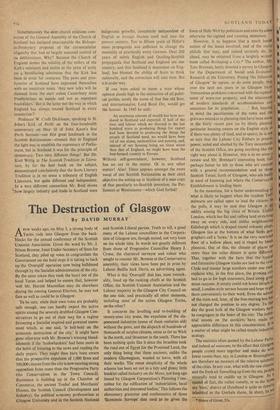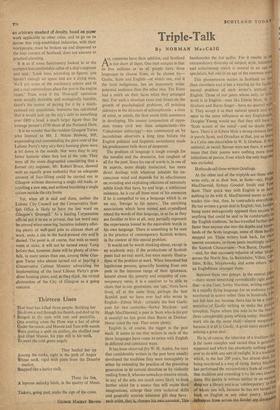The Destruction of Glasgow
By DAVID MURRAY AFEW weeks ago, on May 1, a strong body of Tories rode into Glasgow from the back- blocks for the annual conference of the Scottish Unionist Association. Given the word by Mr. J. Nixon Browne, Joint Under-Secretary of State for Scotland, they piled up votes to congratulate the Government on the bold steps it is taking to back up the 'Overspill' operation now being bulldozed through by the Socialist administration of the city. By the same token they took the heart out of the local Tories and helped to ensure that, however well Mr. Harold Macmillan may do elsewhere during the coming General Election, he may not fare so well as could be in Glasgow.
To be sure, while their own votes are probably safe enough, one can hardly expect the active spirits among the severely drubbed Glasgow Con- servatives to go out of their way for a regime favouring a Socialist inspired and powered move- ment which, as one said, 'is hell-bent on the economic destruction of the city.' It might have gone otherwise with Mr. Browne's winning bland- ishments if the 'bushwhackers' had been more in the habit of listening to the news and reading the daily papers. They might then have been aware that the prospective expulsion of 1,000 firms and 300,000 citizens from the city is now meeting strong opposition from more than the Progressive Party (the Conservatives in the Town Council). Resistance is building up in the Chamber of Commerce, the ancient Trades' and Merchants' Houses, the Scottish Council (Development and Industry), the political economy professoriate at Glasgow University and in the Scottish National and Scottish Liberal parties. Truth to tell, a good many of the Labour councillors in the Corpora- tion of Glasgow are, though muted, not very keen on the whole idea. In words not greatly different from those of Progressive Councillor Henry J. Crone, the chartered surveyor and valuer who sought to counter Mr. Browne at the Conservative assembly, their views have been put in print by Labour Baillie Jack Davis, an advertising agent.
What is this 'Overspill' that has, most remark- ably, lined up the ranking chiefs at the Scottish Office, the Scottish Unionist Association and the Labour majority in the Glasgow City Council on the one side, and practically all other elements, including most of the active Glasgow Tories, on the other?
It concerns the levelling and re-building of twenty-nine city areas, the expulsion of the dis- possessed industries (some of them centuries old) without the gates, and the dispatch of hundreds of thousands of surplus citizens, some as far as Wick in the north, and Stranraer in the south. There has been nothing quite like it since the Israelites took the road out of Egypt for the Promised Land, the only thing being that these ancients, unlike the modern Glaswegians, wanted to leave, with all their works. The sweet simplicity of the whole scheme has been set out in a tidy and glossy little booklet called Industry on the Move, not long ago issued by Glasgow Corporation's Planning Com- mittee for the edification of 'industrialists, local authorities and interested bodies.' This follows the elementary grammar and mathematics of those 'Economic Surveys' that used to be given the force of Holy Writby politicians and even by some ; otherwise far-sighted and cunning statesmen. /. However, it so happens that a much better II notion of the issues involved, and of the many N pitfalls that may, and indeed certainly do, lie ahead, may be obtained from a brightly written !I book called Reshaping a City.* The author, Mr. 1 Tom Brennan, lately directed a survey in Glasgow ki for the Department of Social' and, Economic 1 Research at the University. Posing 'the Dilemma II of Glasgow' he agrees, as do most people, that 0 over the next ten years or so Glasgow faces L 'tremendous problems concerned with the replace- ri ment of worn-out property, and the attainment g of modern standards of accofnmodation and [ amenities for its population. . . .' But, bearing [ in mind the peculiarities of the town and the ! grievous mistakes in planning that have been made 1 in the fairly recent past (as by thinly planting i: perimeter housing estates on the English style ag ill if there was plenty of land, and to spare), he is not I so sure that the Labour City Fathers in present power, aided and abetted by the Tory incumbents of the Scottish Office, are going anything like the right way about it. However, this is in no sense a review and Mr. Brennan's• interesting book had perhaps better be left to those who are content ! with a general recommendation and to thosf 1 Scottish Tories, furth of Glasgow, who are badlY in need of knowing just where the Conservati4e Establishment is leading them. I w - In the meantime, for a better understanding 44hat is likely to happen when the resident To4. stalwarts are called upon to lead the citizens Ie ill the polls, it may be said that Glasgow is 49 i oddity among the big cities of Britain. Unlike London, which has flat and rolling land stretching away on every side, and unlike neighbouring Edinburgh which is draped round volcanic plugs, Glasgow lies at the bottom of what Stois geo' graphers call a 'howe.' It is on the very restricted floor of a hollow place, and is ringed by bleak plateaux. Out of this, the climate of places no more than ten miles distant is quite different. That, together with the facts that the typical and formative Glasgow trades are tied to the river Clyde and' muster large numbers under one roofs explains why, in the first place, the growing citY had to go in for high tenements, lined alonf greet street canyons. It simply could not house people /0 small, London-style terrace houses and hope to get them conveniently to their work. Even the adverlt of the tram and, later, of the free-moving bus he5 not changed the position to any degree. To tilt° day the great bulk of the Glawow workers have to congregate in the heart of the city. The indh°. trial estates on the outskirts have made n° appreciable difference to this concentration. ll ts, a matter of what might be called simple industrial ecology.
The statistics often quoted by the Labour PartY' and indeed ad nauseam, to the effect thatGlasgmvt. people crowd more together and make do wit" fewer rooms than, say, in London or Birmingham' are therefore no measure of the relative salubrity of the cities. In any case, what with the raw climate and the fresh air funnelling up from the sea, pe0P14 naturally tend to cuddle up in Glasgow. As a matte& of fact, the rather comely, or as the ScMa say 'hien,' district of Hyndland is quite as denselY inhabited as the Gorbals slums. In short,_ to set __---- • House of Grant, 25s.
an arbitrary standard of density, based on paper work applicable to other cities, and to go on to decree that long-established industries, with their workpeople, must be broken up and dispersed to the four corners of Scotland, does not amount to practical planning.
It is as if some functionary looked in at the compact but comfortable cabin of a ship's engineer and said : 'Look here, according to figures, you haven't enough air space and are a dying man. We'll put some of the machinery ashore and fit out a real commodious place for you in the engine room.' Then, even if the 'Overspill' operation were socially desirable and ecologically feasible, there's the matter of paying for it by a much- reduced city population. Someone has calculated that it would jack up the city's debt to something over £800 a head, a much larger figure than the average person's £530 share of the National Debt.
It is no wonder that the resident Glasgow Tories who listened to Mr. J. Nixon Browne, MP, expounding and commending the pure root of the Labour Party's very airy-fairy housing plans were a bit down in the mouth. Nor were they in any better humour when they lost at the vote. They were all the more disgruntled considering that a former city engineer, Mr. Robert Bruce, showed with an equally great authority that an adequate amount of face-lifting could be carried out in Glasgow without dismissing a single old trade, or epclling a new one, and without banishing a single citizen outside the city limits.
Yet, when all is said and done, neither the Labour City Council nor the Conservative Scot- tish 011ice is likely to have the last word on Glasgow's 'Overspill.' As a leading Corporation official put it to me in private, that last word may be uttered when some big, lucrative industry offer- ing plenty of well-paid jobs to citizens short of work, seeks a site in the hard-pressed city and is denied. The point is, of course, that with so many votes at stake, it will not be turned away. Long before that, however, there will be plenty of cross- talk, in more senses than one, among those Glas- gow Tories who almost turned red at hearing. a
Conservative Cabinet Minister advocating the Implementing of the local Labour Party's gran- diose housing plans, and, as they think, the virtual diestruction of the City of Glasgow as a going concern.















































 Previous page
Previous page